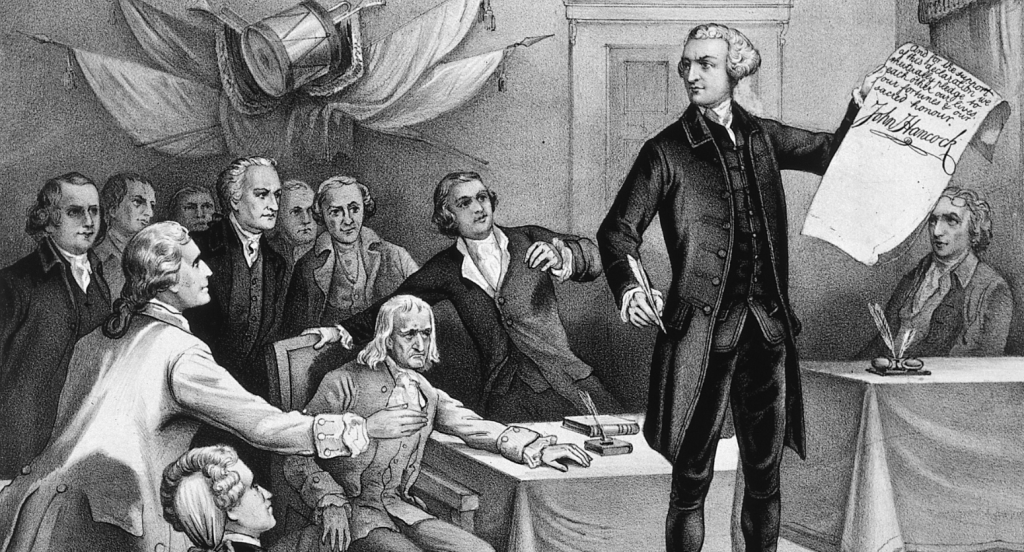When we think of the American Revolution, fiery speeches and bold actions often come to mind. But what about the quiet, introspective figures who shaped the course of history? Enter Thomas Jefferson, the man who, despite his shy demeanor and soft-spoken nature, authored one of the most revolutionary documents in human history: the Declaration of Independence.

The Reluctant Revolutionary: Jefferson’s Early Life
Born on April 13, 1743, in Virginia, Thomas Jefferson was the son of a wealthy plantation owner and slaveholder, Peter Jefferson, and Jane Randolph, a member of one of Virginia’s most influential families. From an early age, Jefferson was surrounded by privilege—and contradiction. He grew up in a world where enslaved people catered to his every need, yet he would later write the immortal words, “All men are created equal.” This paradox would define much of Jefferson’s life and legacy.
As a child, Jefferson was deeply influenced by his father’s love of learning. He developed a passion for literature, philosophy, and the natural world, often exploring the Virginia countryside with his best friend, Dabney Carr. The two boys made a pact: whoever died first would be buried on a hill overlooking Jefferson’s family estate. True to his word, Jefferson later built his iconic home, Monticello, on that very hill and buried Carr there when he passed away at just 30 years old.
The Scholar and the Statesman
Jefferson’s education at the College of William & Mary marked a turning point in his life. Initially, he was more interested in parties than books, but after a wake-up call during his first year, he threw himself into his studies. He became fluent in multiple languages, studied law under the renowned George Wythe, and immersed himself in Enlightenment philosophy. These formative years shaped Jefferson into a polymath—a man of science, architecture, music, and politics.
By 1769, Jefferson had entered the political arena as a member of the Virginia House of Burgesses. He quickly gained a reputation as a thoughtful and articulate advocate for colonial rights. His 1774 pamphlet, A Summary View of the Rights of British America, argued against Parliament’s authority over the colonies and caught the attention of revolutionary leaders like John Adams and Benjamin Franklin.
The Reluctant Author of Independence
In June 1775, Jefferson arrived in Philadelphia as a replacement delegate to the Second Continental Congress. He was 32 years old, tall, red-haired, and painfully shy. While others debated loudly, Jefferson preferred to listen and observe. But his quiet demeanor masked a sharp mind and a gift for writing.
When Congress formed a committee to draft a declaration of independence in June 1776, John Adams handpicked Jefferson to write the first draft. Jefferson initially resisted, suggesting Adams or Franklin take the lead. But Adams insisted, famously telling Jefferson, “You can write ten times better than I can.” With Franklin’s encouragement, Jefferson reluctantly agreed.
Over the next few days, Jefferson poured his heart and soul into the document. Drawing on Enlightenment ideals, he crafted a powerful argument for independence, rooted in the belief that “all men are created equal” and endowed with “unalienable rights” to “life, liberty, and the pursuit of happiness.” These words, though aspirational and far from fully realized at the time, would become the foundation of American democracy.
The Declaration’s Legacy: A Blueprint for Freedom
The Declaration of Independence was adopted on July 4, 1776, but its impact extended far beyond the American colonies. Jefferson’s eloquent prose articulated a vision of human rights and self-governance that inspired revolutions around the world. From the French Revolution to modern movements for equality and justice, the Declaration’s principles continue to resonate.
Yet, Jefferson’s legacy is not without its contradictions. A slaveholder who championed liberty, he embodied the tensions between America’s ideals and its realities. His original draft of the Declaration included a condemnation of slavery, but this passage was removed to secure the support of Southern colonies. This compromise foreshadowed the nation’s long struggle with the issue of slavery—a struggle that would culminate in the Civil War.
Jefferson’s Enduring Influence
Thomas Jefferson’s contributions to American history extend far beyond the Declaration. As the third President of the United States, he championed individual rights, religious freedom, and westward expansion. His vision of an “empire of liberty” shaped the nation’s identity and aspirations.
Today, Jefferson’s words and ideas remain a touchstone for debates about freedom, equality, and the role of government. His belief in the power of education and the importance of an informed citizenry continues to inspire efforts to expand access to knowledge and opportunity.
Conclusion: The Quiet Revolutionary’s Lasting Impact
Thomas Jefferson may have been a man of contradictions, but his contributions to the American Revolution and the founding of the United States are undeniable. From the halls of Monticello to the pages of the Declaration of Independence, Jefferson’s legacy is a testament to the power of ideas and the enduring quest for freedom.
As we reflect on Jefferson’s life and work, we are reminded that the pursuit of liberty is an ongoing journey—one that requires us to confront our contradictions, challenge our assumptions, and strive to live up to the ideals we hold dear. In the words of Jefferson himself, “The price of freedom is eternal vigilance.” And perhaps, it is also the courage to dream of a better world, even in the face of our imperfections.

No comments yet.